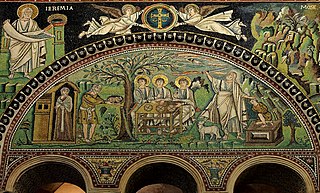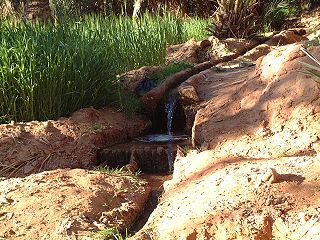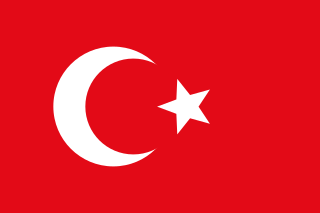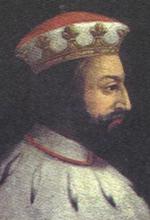Related Research Articles

Abraham is the common Hebrew patriarch of the Abrahamic religions, including Judaism, Christianity, and Islam. In Judaism, he is the founding father of the special relationship between the Jews and God; in Christianity, he is the spiritual progenitor of all believers, whether Jewish or non-Jewish; and in Islam, he is a link in the chain of Islamic prophets that begins with Adam and culminates in Muhammad.
The Book of Genesis is the first book of the Hebrew Bible and the Christian Old Testament. Its Hebrew name is the same as its first word, Bereshit. Genesis is an account of the creation of the world, the early history of humanity, and the origins of the Jewish people.

Peter Mark Roget was a British physician, natural theologian, lexicographer, and founding secretary of The Portico Library. He is best known for publishing, in 1852, the Thesaurus of English Words and Phrases, a classified collection of related words (thesaurus). He also read a paper to the Royal Society about a peculiar optical illusion in 1824, which is often regarded as the origin of the persistence of vision theory that was later commonly used to explain apparent motion in film and animation.

The Binding of Isaac, or simply "The Binding", is a story from Genesis 22 of the Hebrew Bible. In the biblical narrative, God orders Abraham to sacrifice his son Isaac at Moriah. As Abraham begins to comply, having bound Isaac to an altar, he is stopped by the Angel of the Lord; a ram appears and is slaughtered in Isaac's stead, as God commends Abraham's pious obedience to offer his son as a human sacrifice.
The Society for the Diffusion of Useful Knowledge (SDUK) was founded in London in 1826, mainly at the instigation of Whig MP Henry Brougham, with the object of publishing information to people who were unable to obtain formal teaching or who preferred self-education. It was a largely Whig organisation, and published inexpensive texts intended to adapt scientific and similarly high-minded material for the rapidly-expanding reading public over twenty years until it was disbanded in 1846.

Eliyahu de Vidas was a 16th-century rabbi in Ottoman Palestine. He was primarily a disciple of Rabbis Moses ben Jacob Cordovero and also Isaac Luria. De Vidas is known for his expertise in the Kabbalah. He wrote Reshit Chochmah, or "The Beginning of Wisdom," a pietistic work that is still widely studied by Orthodox Jews today. Just as his teacher Rabbi Moses Cordovero created an ethical work according to kabbalistic principles in his Tomer Devorah, Rabbi de Vidas created an even more expansive work on the spiritual life with his Reishit Chochmah. This magnum opus is largely based on the Zohar, but also reflects a wide range of traditional sources. The author lived in Safed and Hebron, and was one of a group of prominent kabbalists living in Hebron during the late 16th and early 17th-century.
Adrastus of Aphrodisias was a Peripatetic philosopher who lived in the first half of the 2nd century AD.

The Arab Agricultural Revolution was the transformation in agriculture in the Old World during the Islamic Golden Age. The agronomic literature of the time, with major books by Ibn Bassal and Abū l-Khayr al-Ishbīlī, demonstrates the extensive diffusion of useful plants to Medieval Spain (al-Andalus), and the growth in Islamic scientific knowledge of agriculture and horticulture. Medieval Arab historians and geographers described al-Andalus as a fertile and prosperous region with abundant water, full of fruit from trees such as the olive and pomegranate. Archaeological evidence demonstrates improvements in animal husbandry and in irrigation such as with the saqiyah waterwheel. These changes made agriculture far more productive, supporting population growth, urbanisation, and increased stratification of society.
Truce/Treaty of Vilna or Truce/Treaty of Niemieża was a treaty signed at Niemieża near Vilnius on 3 November 1656 between Tsardom of Russia and Polish–Lithuanian Commonwealth, introducing a truce during the Russo-Polish War (1654–67) and an anti-Swedish alliance in the contemporaneous Second Northern War. In return for ceasing hostilities and fighting Sweden alongside Poland–Lithuania, the treaty promised Alexis of Russia succession in Poland after John II Casimir Vasa's death. The Cossacks under Bohdan Khmelnytsky were excluded from the negotiations, and subsequently supported the Transylvanian invasion on the Swedish side.
Nationality words link to articles with information on the nation's poetry or literature.
Nationality words link to articles with information on the nation's poetry or literature.

John Winter Jones was an English librarian. He was Principal Librarian of the British Museum between 1866 and 1873. He was the first President of the Library Association in the U.K.

Paul Skalich (1534–1573), also known as Stanislav Pavao Skalić or Paulus Scalichius de Lika, was an encyclopedist, Renaissance humanist, polymath and adventurer born in Zagreb and who lived part of his life in the Holy Roman Empire. His surname is rendered in various other ways: e.g., in English, Skalich, Scalich, Scaliger; in Latin, Scalichius or Scaligius; and Spanish, Scalitzius.
The history of Palestinian rabbis encompasses the Israelites from the Anshi Knesses HaGedola period up until modern times, but most significantly refers to the early Jewish sages who dwelled in the Holy Land and compiled the Mishna and its later commentary, the Jerusalem Talmud. During the Talmudic and later Geonim period, Palestinian rabbis exerted influence over Syria and Egypt, whilst the authorities in Babylonia had held sway over the Jews of Iraq and Iran. While the Jerusalem Talmud was not to become authoritative against the Babylonian Talmud, the liturgy developed by Palestinian rabbis was later destined to form the foundation of the minhag Ashkenaz that was used by nearly all Ashkenazi communities across Europe before Hasidic Judaism.

The Sanjak of Avlona was one of the sanjaks of the Ottoman Empire whose county town was Berat in Albania. It was established in 1466, after the construction of the Elbasan Castle of the territory that belonged to the preceding Ottoman sanjak, Sanjak of Albania.

Giorgio Adorno was a statesman who became doge of the Republic of Genoa for two years. His father was Adornino Adorno and his mother Nicolosia della Rocca and his brother, Antoniotto, was elected four times as doge of the Republic. He was born c. 1350 but little is known about his youth except that he married Pietrina Montaldo, daughter of the doge Leonardo Montaldo. With her he had nine children, including the future doge Raffaele Adorno.

Abraham Cohen was a Jewish physician, rabbi, religious philosopher and poet on Zante (Zakynthos), an Ionian Island, and an overseas colony of the Venetian Republic.

Reichersberg Abbey is a monastery of the Innviertel Congregation of the Austrian Augustinian Canons. It lies on the Inn River in Reichersberg, Upper Austria.
Judah ben Abraham Zarko was a 16th-century Greek Hebrew poet. Born at Rhodes, he lived for a few years at Salonika where he joined the Ḥakme ha-shir literary circle.
Shabtai Ambron was an Italian Jewish philosopher and astronomer.
References
- 1 2 3 Abraham David; Dena Ordan (28 May 2010). To Come to the Land: Immigration and Settlement in 16th-Century Eretz-Israel. University of Alabama Press. p. 141. ISBN 978-0-8173-5643-9 . Retrieved 19 September 2011.
- ↑ Isaac Judah Jehiel Safrin (November 1999). Jewish mystical autobiographies: Book of visions and Book of secrets . Paulist Press. p. 89. ISBN 978-0-8091-3876-0 . Retrieved 19 September 2011.
- ↑ Society for the Diffusion of Useful Knowledge (Great Britain) (1842). The biographical dictionary of the Society for the diffusion of useful knowledge--. Longman, Brown, Green, and Longmans. p. 150. Retrieved 19 September 2011.